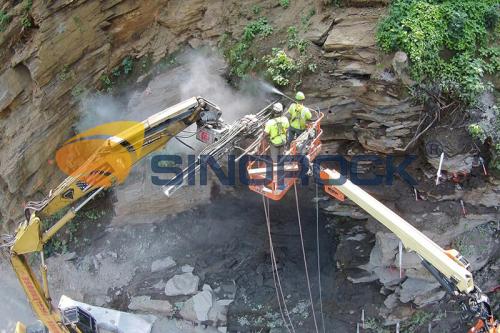How to Construct Self-drilling Hollow Rock Bolt in Sand Slate Stratum?

Slate belongs to the metamorphic rocks in the three major rock types. It is generally formed by the metamorphism of mudstone of sedimentary rocks. It has a plate-like structure and a relatively low degree of metamorphism. The silty slate is formed by the metamorphism of silty mudstone and contains a certain amount of silt. In the fault zone, the overall rock mass is relatively broken to broken, and there is scattered fissure water, which brings great difficulties to the support construction. Under such geological conditions, what are the challenges of ordinary mortar bolt construction? How to construct self-drilling hollow rock bolts?
The Ordinary Mortar Bolt Construction
Layers, interlayer extrusion dislocation zones, faults, and joint
fissures are developed in the rock body; the in-situ stress in the deep rock
body of the valley slope is high, and the superficial rock mass has strong
relaxation due to stress release and unloading, and there are deep fractures in
the deep part of the bank slope.
The mortar bolt is made of Φ28mm threaded steel, and a Φ60mm
cross-shaped alloy drill is used to make holes.
Drilling Process
Inspection (drill bit water hole) → drilling → hole cleaning →
drilling → bolt installation → inserting grouting pipe → grouting
During the construction process, the phenomenon of sticking is
obvious when drilling. After the drilling is completed, the bolt cannot be
installed to the designed hole depth when installing the bolt. When drilling
with mortar bolts, in order to prevent the drill pipe from being stuck in the
hole until it reaches the bottom of the hole and cannot be taken out, the drill
pipe should be continuously lifted and lowered during the drilling process, and
the holes should be blown and repeatedly swept while drilling. The phenomenon
of internal block dropping is serious, so the drilling speed of the mortar bolt
is slow.
The Self-drilling Hollow Rock Bolt Construction
Introduction of
Self-Drilling Hollow Rock Bolt
Self-drilling anchor rod drilling and anchor rod installation are
synchronous construction, that is, the drill rod and the anchor rod are
combined into one. When the anchor rod hole is drilled to the final hole, the
anchor rod installation also reaches the corresponding depth. This caused the
failure to form holes due to the collapse of the overburden layer and the
bedrock crushed zone, resulting in the occurrence of the phenomenon that the
bolt installation could not be constructed.
Drill Selection
Since slate is a metamorphic rock with high hardness, alloy drill
bits should be used for construction in slate geology. Self-drilling bolts use
cross-shaped alloy drill bits. The self-drilling bolt is directly installed on
the power head, and the front end of the self-drilling bolt is installed with
an alloy drill bit for impact rotary drilling.
Construction Process
Drilling process: inspection (drill water hole) → review (whether
there is foreign matter blockage) → drilling → hole cleaning → installation of
slurry stopper → grouting → installation of backing plate and nuts
Advantages
Drill relatively fast in this formation, low requirements on the
hole wall, good hole forming effect, and no hole collapse phenomenon;
Has a rich variety of drill bits, and the drill bit can be selected
according to the properties of rock and soil, which can improve the drilling
efficiency;
Can fill cracks, consolidate rock mass and soil layer through
pressure grouting, and has good grouting spreading radius and reliable
anchoring quality;
Can be cut arbitrarily and lengthened by the coupler. Therefore, the
self-drilling anchor bolt is suitable for construction in a narrow space that
large equipment cannot enter.
Summary
The self-drilling hollow rock bolt is safe,
efficient, and convenient. It is suitable for broken rock, loose soil, and
geological conditions where is difficult to drill holes. It helps to ensure the
anchoring effect in complex ground conditions and achieve the best construction
result. In addition, the drilling speed is much faster than the mortar bolts.
Comments